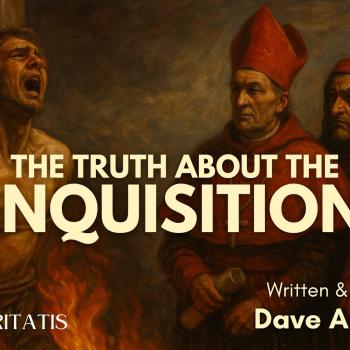If I hear another Lutheran try to deny that this is true, I think I’ll scream. It’s happened once again, and comically (for those who love irony as I do), from one who has been a vocal critic lately with regard to my supposed profound ignorance about Luther. He wrote on the Catholic Message Board:
. . . he was imperfect too. But not all the stuff you have read is true. He was not a fornicator, he was a good father and husband. His language was sometimes enough to make your skin crawl. He was “rough”, but not evil. There were Lutherans who took things too far and yes they killed people for their beliefs. Not a good thing, not Luther either.
Here are the documented facts:
Luther sanctioned capital punishment for doctrinal heresy most notably in his Commentary on the 82nd Psalm (vol. 13, pp. 39-72 in the 55-volume set, Luther’s Works, edited by Jaroslav Pelikan et al), written in 1530, where he advocated the following:
A question arises in connection with these three verses [Psalm 82]. Since the gods, or rulers, beside their other virtues, are to advance God’s Word and its preachers, are they also to put down opposing doctrines or heresies, since no one can be forced to believe? The answer to this question is as follows: First, some heretics are seditious and teach openly that no rulers are to be tolerated; that no Christian may occupy a position of rulership; that no one ought to have property of his own but should run away from wife and child and leave house and home; or that all property shall be held in common. These teachers are immediately, and without doubt, to be punished by the rulers, as men who are resisting temporal law and government (Rom. 13:1, 2). They are not heretics only but rebels, who are attacking the rulers and their government, just as a thief attacks another’s goods, a murderer another’s body, an adulterer another’s wife; and this is not to be tolerated.
Second. If some were to teach doctrines contradicting an article of faith clearly grounded in Scripture and believed throughout the world by all Christendom, such as the articles we teach children in the Creed—for example, if anyone were to teach that Christ is not God, but a mere man and like other prophets, as the Turks and the Anabaptists hold—such teachers should not be tolerated, but punished as blasphemers. For they are not mere heretics but open blasphemers; and rulers are in duty bound to punish blasphemers as they punish those who curse, swear, revile, abuse, defame, and slander. With their blasphemy such teachers defame the name of God and rob their neighbor of his honor in the eyes of the world. In like manner, the rulers should also punish—or certainly not tolerate—those who teach that Christ did not die for our sins, but that everyone shall make his own satisfaction for them. For that, too, is blasphemy against the Gospel and against the article we pray in the Creed: “I believe in the forgiveness of sins” and “in Jesus Christ, dead and risen.” Those should be treated in the same way who teach that the resurrection of the dead and the life everlasting are nothing, that there is no hell, and like things, as did the Sadducees and the Epicureans, of whom many are now arising among the great wiseacres.
By this procedure no one is compelled to believe, for he can still believe what he will; but he is forbidden to teach and to blaspheme. For by so doing he would take from God and the Christians their doctrine and word, and he would do them this injury under their own protection and by means of the things all have in common. Let him go to some place where there are no Christians. For, as I have often said: He who makes a living from the citizens ought to keep the law of the city, and not defame and revile it; or else he ought to get out. We are told that when the holy fathers at the Council of Nicea heard the doctrine of the Arians read, all hissed unanimously, and would not listen or permit any argument or defense but condemned them out of hand, without disputation, as blasphemers. Moses in his Law commands that such blasphemers and indeed all false teachers should be stoned (Lev. 24:16). So, in this case, there ought not to be much disputing; but such open blasphemers should be condemned without a hearing and without defense, as Paul commands (Titus 3:10): “A heretic is to be avoided and let go, after he has been admonished once or twice”; and he forbids Timothy to wrangle and dispute, since this has no effect, except to pervert those who hear (1 Tim. 6:20). For these common articles of all Christendom have had hearing enough. They have been proved and decreed by the Scriptures and by the confession of the whole church, confirmed by many miracles, and sealed by the blood of many holy martyrs. They are testified to and defended in the books of all the doctors. They need no more discussion and clever interpretation.
(Luther’s Works [LW], Vol. 13, 61-62; bolding added)
Is this merely my interpretation of his words and thoughts? Hardly. The famous Luther biographer Roland Bainton wrote:
In 1530 Luther advanced the view that two offences should be penalized even with death, namely sedition and blasphemy. The emphasis was thus shifted from incorrect belief to its public manifestation by word and deed. This was, however, no great gain for liberty, because Luther construed mere abstention from public office and military service as sedition and a rejection of an article of the Apostles’ Creed as blasphemy.
In a memorandum of 1531, composed by Melanchthon and signed by Luther, a rejection of the ministerial office was described as insufferable blasphemy, and the disintegration of the Church as sedition against the ecclesiastical order. In a memorandum of 1536, again composed by Melanchthon and signed by Luther, the distinction between the peaceful and the revolutionary Anabaptists was obliterated . . .
Melanchthon this time argued that even the passive action of the Anabaptists in rejecting government, oaths, private property, and marriages outside the faith was itself disruptive of the civil order and therefore seditious. The Anabaptist protest against the punishment of blasphemy was itself blasphemy. The discontinuance of infant baptism would produce a heathen society and separation from the Church, and the formation of sects was an offense against God.
Luther may not have been too happy about signing these memoranda. At any rate he appended postscripts to each. To the first he said,
I assent. Although it seems cruel to punish them with the sword, it is crueler that they condemn the ministry of the Word and have no well-grounded doctrine and suppress the true and in this way seek to subvert the civil order.
. . . In 1540 he is reported in his Table Talk to have returned to the position of Philip of Hesse that only seditious Anabaptists should be executed; the others should be merely banished. But Luther passed by many an opportunity to speak a word for those who with joy gave themselves as sheep for the slaughter.
. . . For the understanding of Luther’s position one must bear in mind that Anabaptism was not in every instance socially innocuous. The year in which Luther signed the memorandum counseling death even for the peaceful Anabaptists was the year in which a group of them ceases to be peaceful . . . By forcible measures they took over the city of Munster in Westphalia . . .
Yet when all these attenuating considerations are adduced, one cannot forget that Melanchthon’s memorandum justified the eradication of the peaceful, not because they were incipient and clandestine revolutionaries, but on the ground that even a peaceful renunciation of the state itself constituted sedition.
(Here I Stand: A Life of Martin Luther, New York: Mentor, 1950, 295-296; bolding added)
Luther signed his name in assent to the 1536 pamphlet written by Philip Melanchthon (noted by biographer Bainton above), in which Melanchthon wrote:
That seditious articles of doctrine should be punished with the sword needed no further proof. For the rest, the Anabaptists hold tenets relating to infant baptism, original sin, and inspiration which have no connection with the Word of God, and are indeed opposed to it. . . . Concerning such tenets, this is our answer : As the secular authorities are bound to control and punish open blasphemy, so they are also bound to restrain and punish avowedly false doctrine, irregular Church services and heresies in their own dominions; for this is commanded by God in the other commandment where He says : “Whoso dishonours God’s name shall not go unpunished.” Everybody is bound, according to his position and office, to prevent and check blasphemy, and by virtue of this command the princes and magistrates have power and authority to put a stop to irregular Church worship. The text in Leviticus xxiv. goes to show the same thing : “He that blasphemeth the name of the Lord, he shall surely be put to death.” The ruling authorities, however, must suffer themselves to be property and correctly instructed in order that they may be certain how to proceed, and that nobody may do wrong. Now there are some among these articles of faith which signify very much. For think what disaster would ensue if children were not baptized; what would be the final outcome but thoroughly heathenish existence? Item, infant baptism rests on such sure foundations that the Anabaptists have no legitimate grounds for rejecting it. Item, if they say that children do not need forgiveness of sins, that there is no original sin, such statements are downright and very dangerous errors. Besides this the Anabaptists separate themselves from the churches, even in those places where pure Christian doctrine prevails, and where the abuses and idolatrous practices have been abolished, and they set up a ministry and congregation of their own, which is also contrary to the command of God. From all this it becomes clear that the secular authorities are bound to suppress blasphemy, false doctrine, and heresy, and to inflict corporal punishment on the offenders. In the case of Anabaptist tenets which are opposed to the secular government the matter is easier to deal with ; for there is no doubt that in such cases the stiffnecked recalcitrants are sure to be punished as sedition-mongers. Also when it is a case of only upholding some spiritual tenet, such as infant baptism, original sin, and unnecessary separation, then, because these articles are also important. . . we conclude that in these cases also the stubborn sectaries must be put to death.
(cited in Johannes Janssen, History of the German People from the Close of the Middle Ages, 16 volumes, translated by A.M. Christie, St. Louis: B. Herder, 1910 [orig. 1891]; Vol. X, 222-223; bolding added)
Stay in touch! Like Biblical Evidence for Catholicism on Facebook:














